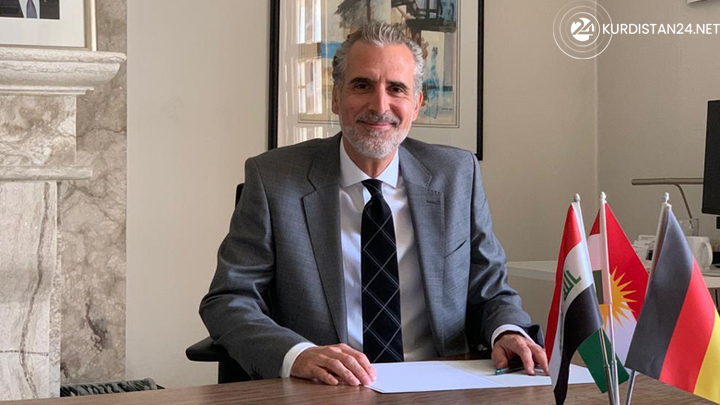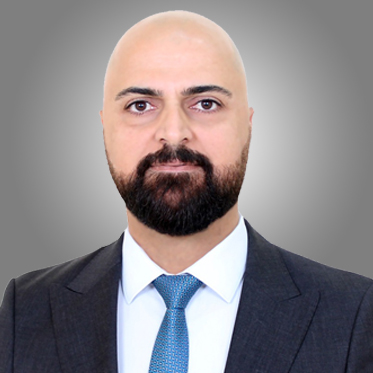‘The German government has been very active in the Kurdistan Region’: Deputy Consul General of Germany in Erbil

ERBIL (Kurdistan 24) – To mark German Unity Day, which is celebrated annually by Germans to mark the reunification of their country at the end of the Cold War, Sven Mossler, the new Deputy Consul General of Germany in Erbil, talked to Kurdistan 24 about topics ranging from his favorite Kurdish food to the business Germany is doing in the autonomous region. Other topics he discussed was cooperation on education and the fight against COVID-19 and the levels of trade between Germany and the Kurdistan Region. And he said there is a planned project for a German-French Cultural Institute in Erbil, which will be the second such institute in the entire world.
Below is Kurdistan 24’s full Q&A with Mr. Mossler. It has been lightly edited for length and clarity.
When did you arrive in Kurdistan Region? What was your first impression of the region? Do you like Kurdish food?
I basically just arrived: I entered the country on September 1, so on October 3 I will have been in the Kurdistan Region of Iraq (KRI) for about one month. In my first weeks I have met many people – namely representatives from the KRG, local project partners and people that have participated in projects funded by the German government and a lot of others – and I have been impressed by their friendliness, their hospitality and their energy. I was also impressed by the beautiful landscape – not only in Erbil. I had the chance to already visit Sulaimani and I plan to visit Dohuk soon. I like Kurdish food very much, especially Kebab, but also Biryani und Qaymagh with Honey.
Today is October 3rd, which is German Unity Day. What does this day mean for the Germans? What is your message to German citizens in the Kurdistan Region on this occasion?
On the 3rd of October, we celebrate the German Unity Day. We celebrate the day that marked the reunification of Germany in 1990, after decades of separation. But we also celebrate the fact that we overcame decades of division: a divided country and a divided Europe that finally came together again. Moreover, looking back, this day for us symbolizes that a collective commitment to a joint vision of democracy, solidarity, togetherness, diversity and freedom will lead to a better future for all.
German Unity Day, of course, celebrates and commemorates the unification of Germany over 30 years ago. Do you think there is anything Kurds can learn from that historical occasion?
We are convinced that this historical achievement can also serve as an example for other regions in which war and conflict have separated people. Here in Iraq and in the KRI we therefore also celebrate this day hoping that Iraq, after defeating Daesh (ISIS), will overcome internal divisions and will become an anchor of peace, stability and understanding in the region. It is in this spirit that the whole German Consulate in Erbil is greeting all its Kurdish friends.
Can you tell us about some of the events/projects your consulate has had in the Kurdistan Region this year? Do you have any future events or projects planned?
The German government has been very active in KRI especially since 2014. As such, a substantial number of projects in the KRI is being implemented by a wide variety of organizations: GIZ, KfW, UNICEF, IOM, UNDP, just to name a few, and a number of international NGOs. Some of these focus on supporting the regional Kurdish authorities in providing basic public services to the local population, including IDPs and refugees as well as their host communities. We have been able to improve access to drinking water, sanitary services and proper waste management to millions of people. In December 2020 for example, we handed over the Faida water network, built for €19 million, to our Kurdish partners. The network supplies over 200,000 people in Dohuk as well the surrounding refugee and IDP camps with drinking water. We were also able to strengthen the health system by handing over the Clinical Skills Training Centre in Dohuk. Equipped and provided with advanced technology, the training centre will provide innovative, simulation-based education. In close cooperation with the Dohuk Department of Health, we have already been able to conduct several trainings that promote patient safety and patient care. We have supported vulnerable children and parents with various tailored services, reaching tens of thousands in 2021 alone.
Providing economic opportunities is also an important part of our cooperation: in the last twelve months, we provided numerous business development grants to small business owners, organized trainings for their staff, offered socio-economic reintegration programs to returnees, and increased access to education, also for vulnerable children, through school grants, developing learning plans, but also with school desks and whiteboards. By supporting two innovation hubs in Sulaimani (51LABS) and Erbil with various bootcamps, competitions and hackathons again in 2020 and 2021, we offer young people chances to unleash their creativity, realize their business ideas and create successful start-ups.
Next to these projects in the area of stabilization and (economic) development, Germany is also very active in a variety of other areas, namely cultural cooperation, education, restauration projects, security sector reform, to name but a few. In the area of cultural cooperation: a very important project is the creation of a German-French Cultural Institute in Erbil in the near future. It will be only the second such institute in the whole world (the first is in Palermo, Italy) and it will have its seat on the Citadel in Erbil.
How closely is Germany working with Iraq, and the Kurdistan Region in particular, to combat the COVID-19 pandemic?
At the height of the pandemic in 2020, we have been very active in attempting to curb infection rates, by equipping thousands of health workers with personal protection equipment and training them on protection and hygiene measures, but also raising awareness among the population with various communication tools. To support the health system, we are for instance financing the construction of specific Covid-hospitals (in total 5 in Iraq, one of them in the KRI, in Sulaimani), and also organizing specific specialized trainings for health professionals. Also, in Sulaimani, we helped establish a laboratory for PCR tests. As a donor through Covax, we are providing vaccines and supporting the distribution throughout the country, including helping equip local vaccination sites.
It is also important to us to combat the negative effects of the pandemic on non-health sectors: We supported 81 schools in KRI for example, covering over 26.000 children, with self-learning materials and upgrading online learning platforms to make sure that education can continue even during the pandemic. By putting a special emphasis on supporting economic opportunities for small business owners, young people and women, we aim to weaken the economic effects of the pandemic. And last but not least we are giving very substantial funding to the WHO in order to support its important work in Iraq.
Does Germany have plans to send military advisors to help with the Peshmerga reform process?
Germany is actively involved in the project of a Peshmerga reform, alongside the KRG and our international partners – the United States, the United Kingdom and the Netherlands, as well as the EU Advisory Mission to Iraq. We are constantly exploring new ways of enhancing our cooperation and our advice, on a political as well as on a military level and will continue our close cooperation with the KRG and our international partners.
How significant is the trade between Germany and the Kurdistan Region? Are there presently any plans to expand it in certain areas? What German companies operate in the Kurdistan Region?
Trade between Germany and Iraq, including the KRI, is substantial. In 2020, it amounted to 900 Mio. Euros worth of exports from Germany to Iraq and 400 Mio. Euros of imports from Iraq to Germany. There is no separate statistic for the KRI, but we estimate that the share of the KRI is about 20-30%. There are about 800 German companies regularly trading with Iraq, about 30 have representation or a branch, e.g. Veridos, Siemens, Vitronic, Gauff. The German software company SAP is currently supporting the KRG in introducing e-government services. Expansion is foreseen in the areas of green technology, such as solar, wind and hydro energy, the digital sector, education and health. In addition, Germany is focusing on the areas of agricultural technologies and irrigation, for example through the Agrofood-Fairs 2021 and 2022).
How closely does Germany work with the Kurdistan Region in the field of education? Do many people from the Kurdistan Region study in Germany? Does the consulate provide any services to help Kurdistan Region residents go to Germany to study in higher education institutions there?
Germany is very actively involved in the field of Kurdish (higher) education through a number of activities and projects. The German Academic Exchange Service (DAAD) has an Information Centre in Erbil. On its website, you will find a lot of information about our cooperation and the possibilities in Germany. In 2019, there were around 1,200 students from Iraq studying in Germany, many of them from the KRI. The numbers are constantly rising – in 2010 there were about 700. The majority is pursuing studies in the area on engineering as well as legal, economic and social studies. Regarding scholarships there are several dedicated programs for Iraq. The most substantial program is the “German-Iraqi Academic Partnerships”, supported by the DAAD and using funds provided by the German Federal Foreign Office. And recently we launched a new program called “Sur Place Scholarships”. Through these and other programs we are able to support between 800 and 900 students from Iraq, many of them from the KRI, every year. In addition, Germany supports the German Department at Salahaddin-University through a DAAD-funded lecturer from Germany as well as through other projects. Finally, I would like to mention a project that is very dear to me: The German School Erbil, that has been founded in 2010 and offers a Kindergarden as well as classes from 1st to 12th grade.
